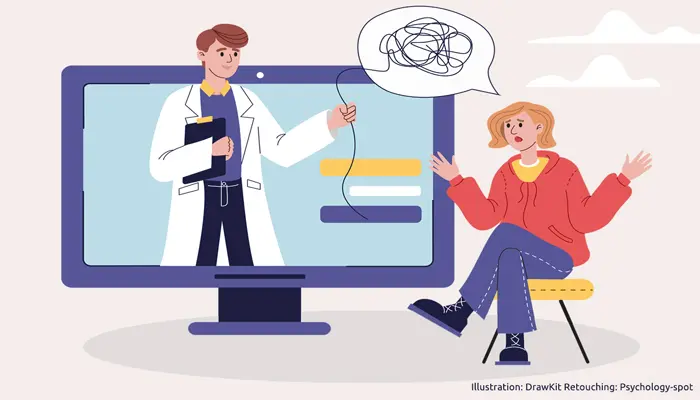
In these times, many aspects of our lives take place between pixels and bytes. Psychology is no exception. Now just a few clicks are enough to have access to a psychotherapist who can help us deal with anxiety or depression, provide us with guidance to manage a difficult situation or accompany us to achieve our goals. Without a doubt, it is very comfortable to have the therapist just a click away. However, does online therapy work for everyone?
The advantages of online counseling
Psychology has also been adapting to the virtual world, experimenting with different formats, so that onlione counseling has been implemented as one more option. Undoubtedly, the multiple benefits of online therapy support this model:
– Goodbye to geographical barriers
One of the biggest advantages of online psychotherapy is that it has broken down geographical barriers. It does not matter where we are, as long as there is an Internet connection. As a result, it has made Psychology services more accessible, both for people living in rural areas and for expatriates or those who have difficulty moving around, such as those suffering from chronic illnesses or a disability that affects their mobility. Thanks to online psychotherapy we can find a specialist who can provide us with the best treatment, even if he is thousands of miles away.
– Time saving
Going to a face-to-face consultation takes time. Not only do you have to calculate the time that the session lasts, but also the transfer, the wait and count on possible traffic jams. When it is difficult for us to find a gap in the agenda, going to the consultation can become a real problem. Precisely, one of the advantages of online therapy is that it saves all those extra minutes that must be added to face-to-face consultations, without having to worry about traffic or travel.
– There is no place like home
Another of the great benefits of online psychotherapy is comfort. We can speak with our therapist from the comfort and privacy of our home. In fact, the possibility of doing therapy from home can help overcome the reluctance to go to a psychologist and reduces the social stigma, which unfortunately still exists, associated with mental disorders. Some people also find it easier to open up because they are in an environment where they feel safe. This allows you to avoid initial blocks, establish a relationship of trust and make therapy progress faster.
– Uninterrupted therapy
Another advantage of online therapy is that it allows treatment to continue without interruptions, which is particularly useful for people who travel a lot. In case of illness or a sudden trip, we will not have to cancel the consultation, but we will be able to continue with the therapy as normal. This continuity is very positive for the psychologist-patient relationship and for the therapy itself, since it allows the results to be consolidated and avoids setbacks. In fact, it also allows you to schedule appointments in potentially destabilizing situations that may occur outside the city, to have the support of the psychologist.
– Same services, but cheaper
The cost of psychological therapy is one of the main barriers to accessing it. As with face-to-face therapy, the cost of online psychotherapy varies depending on the service and the level of support required. There are psychologists who charge the same in both modalities since patients receive the same services, time and attention. However, it is easy to access more affordable care if certain platforms are used as these allow psychologists to reduce their costs, especially if a membership is purchased.
Does online therapy work?
The effectiveness of psychotherapy depends on numerous factors, from the type of psychological counseling used to the patient’s therapeutic adherence, the type of disorder and its severity, as well as the experience of the psychologist. The same goes for online psychotherapy.
Actually, the perception of online psychotherapy is very positive. A study published in the Journal of Telemedicine and Telecare found that 93% of patients receiving psychotherapy online felt they could address the same issues virtually as they could in person. 96% were satisfied with the online sessions and 85% felt comfortable with the communication.
As long as communication flows and the patient feels comfortable, psychotherapy should progress. In fact, another investigation carried out at the Jacobs University of Bremen indicated that “There were no significant differences between the groups in terms of dropout rates” and that adherence to treatment in the online group even exceeded face-to-face sessions.
On the other hand, a study conducted at Linköping University found that online psychotherapy is as effective as face-to-face therapy for treating depression. Researchers at the Leuphana University of Lüneburg also found that this type of therapy is effective in treating anxiety in young people.
In general, most research confirms that online psychotherapy works. Combined with face-to-face therapy, it also leads to lower dropout rates and higher abstinence rates in patients suffering from addictions. In addition, it is a particularly useful tool to maintain the changes initially achieved within the framework of long-term psychotherapy.
However, it is no less true that some people may feel less supported and motivated in online psychotherapy, compared to face-to-face therapy, so it is important to determine if it is the most appropriate model to receive psychological help.
Online therapy: Who is it for?
Despite all the advantages of online therapy, it is not always the best solution for everyone. The general rule is: the more serious the problem, the better is to seek face-to-face care.
Due to limited insight abilities or the serious nature of certain psychopathological conditions, such as suicidal ideation, personality disorders, chronic syndromes or psychotic disorders, it is best to seek personal help. In these cases, psychologists can react to emergency situations, such as acute psycohotic decompensation.
Traditional therapy settings can help patients with self-reflection, especially if they are new to expressing their emotions and thoughts. Those who prefer face-to-face dialogue and are not comfortable using digital tools will undoubtedly benefit more from face-to-face psychotherapy, since online sessions could even increase their level of anxiety or inhibit them.
On the other hand, people who feel more comfortable interacting through a screen could benefit a lot from online therapy. This type of therapy is being used to treat multiple problems, from anxiety and depression to OCD, relationship problems, adjustment disorders or body image problems. In fact, it is also very effective in combination with face-to-face therapy for follow-up sessions, even in psychiatric disorders.
In any case, the most important thing for online psychotherapy to work is that the patient feels comfortable, motivated and supported.
Sources:
Urness, D. et. Al. (2006) Client acceptability and quality of life – telepsychiatry compared to in-person consultation. Journal of Telemedicine and Telecare; 12(5): 251-254.
Lippke, S. et. Al. (2021) Adherence With Online Therapy vs Face-to-Face Therapy and With Online Therapy vs Care as Usual: Secondary Analysis of Two Randomized Controlled Trials. J Med Internet Res; 23(11): e31274.
Andersson, G. et. Al. (2016) Internet-supported versus face-to-face cognitive behavior therapy for depression. Expert Rev Neurother; 16(1):55-60.
Ebert, D. D. et. Al (2015) Internet and computer-based cognitive behavioral therapy for anxiety and depression in youth: a meta-analysis of randomized controlled outcome trials. PLoS One;10(3): e0119895.



